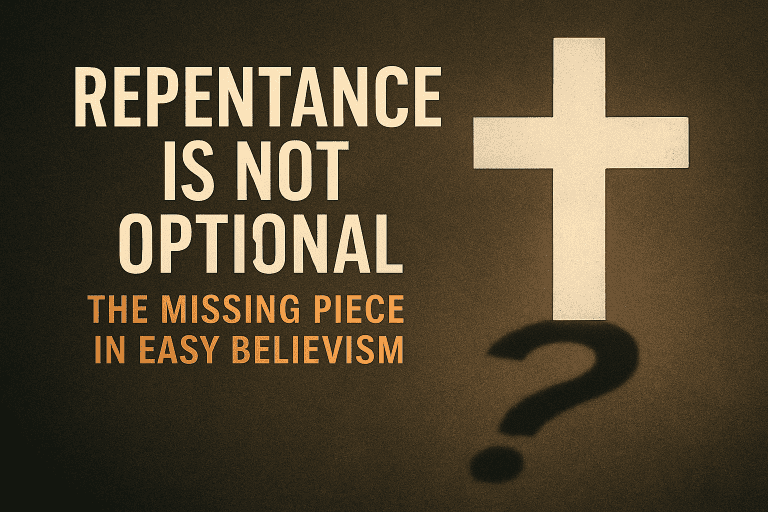5 Essential Christian Beliefs Most Churches Won’t Teach
Confused about what core Christian beliefs really are? Here are 5 foundational truths from Scripture that every believer should know — clearly explained, no church lingo, no fluff. They separate the gospel from false teaching. They expose counterfeits. And they form the core of what it means to follow Jesus as Lord.

Christianity Isn’t a Blank Label
Christianity doesn’t mean whatever the modern world says it means. You can’t stretch it to fit your lifestyle or bend it to match your politics. God has spoken—and He doesn’t stutter.
The faith revealed in Scripture is not a fog of personal opinions or sentimental slogans. It’s a rock. You either stand on it or you don’t. And the lines are clearer than most people want to admit.
These aren’t the only truths that matter—but without them, you don’t have Christianity at all.
1. The Authority of Scripture
Christianity rests on the conviction that the Bible is the inspired, inerrant Word of God. Scripture doesn’t simply contain truth—it is truth (John 17:17). From Genesis to Revelation, it speaks with divine authority, revealing God’s character, His commands, and His redemptive plan.
Because the Bible is God-breathed (2 Timothy 3:16), it stands above all human opinion, cultural trends, and religious traditions. Christians are not free to edit, ignore, or reinterpret it to fit modern preferences. To deny the authority of Scripture is to place man’s word above God’s—and that is the foundation of spiritual ruin.
The church doesn’t stand over the Bible; the Bible stands over the church. All doctrine, preaching, worship, and Christian living must flow from its pages. If Scripture is not our final authority, then our faith is no more reliable than the shifting ideas of man.
2. The Triune God
The one true God eternally exists in three distinct Persons: Father, Son, and Holy Spirit. This is not a contradiction but a divine mystery revealed throughout Scripture. God is one in essence, yet three in personhood—coequal, coeternal, and completely unified (Matthew 28:19; 2 Corinthians 13:14).
The Father plans, the Son accomplishes, and the Spirit applies. At creation, all three were present (Genesis 1:1–2; John 1:1–3). At Christ’s baptism, all three were active (Luke 3:21–22). And in the life of every believer, all three are working to bring about salvation and sanctification.
To reject the Trinity is to reject the God of the Bible. The Triune nature of God guards against false views—like modalism (that God changes forms) or polytheism (that there are multiple gods). Christians worship the Father, through the Son, by the Spirit—not three gods, but one glorious, eternal, relational God.
3. The Deity and Work of Christ
Jesus Christ is fully God and fully man—eternal in nature, sinless in life, and sovereign in power (John 1:1, Colossians 2:9). He was not created. He is the radiance of God’s glory and the exact imprint of His nature (Hebrews 1:3). From the virgin birth to the resurrection, every part of His life reveals His divine identity and perfect obedience.
His work is the centerpiece of redemptive history. On the cross, Jesus bore the wrath of God for sinners, satisfying divine justice through His substitutionary death (Isaiah 53:5; Romans 5:8). He rose bodily on the third day, defeating death, validating His claims, and securing eternal life for those who believe.
To deny Christ’s deity is to reject the very heart of Christianity. He is not merely a good teacher or moral leader—He is Lord of all. The only Savior. The final Judge. And He is returning—not as a suffering servant, but as a reigning King (Revelation 19:11–16).
4. Salvation by Grace Through Faith
Salvation is not earned. It is a gift of God’s grace, received through faith in Jesus Christ alone (Ephesians 2:8–9). No amount of good works, religious effort, or moral sincerity can remove the stain of sin or earn a place in heaven. Only Christ’s righteousness—credited to the sinner by faith—can reconcile us to God.
The gospel declares that Christ died for our sins, was buried, and rose again—all according to the Scriptures (1 Corinthians 15:3–4). This finished work is applied to each believer not by merit but by trusting in Him. Repentance and faith are not contributions to salvation—they are the evidence that grace has come.
To add anything to the gospel is to nullify it. Whether it’s sacraments, performance, or personal transformation, anything that shifts the focus from grace alone undermines the cross. Salvation begins, continues, and ends with the sovereign grace of God. The only proper response is humble faith and lifelong obedience.
5. Eternal Destiny
Every person will live forever—either in the joy of God’s presence or under the weight of His judgment. The Bible teaches plainly that heaven and hell are real, eternal destinations (Matthew 25:46). Those who trust in Christ will enter into everlasting life. Those who reject Him will face eternal separation and wrath.
Hell is not a metaphor. It is the just punishment for sin against a holy God—conscious, irreversible, and deserved (2 Thessalonians 1:9). Jesus spoke more about hell than anyone else in Scripture, not to scare but to warn. It is not cruel for God to judge—it is just.
Heaven, by contrast, is the promised inheritance of the redeemed. A place of worship, joy, and unbroken fellowship with the triune God (Revelation 21:3–4). Not because we are good, but because Christ is. The promise of eternity puts every earthly sorrow in perspective—and fuels our urgency to proclaim the gospel while there is still time.
The 5 Essential Beliefs of Christianity Are Not Open for Revision
In every generation, someone tries to edit Christianity. Remove the hard parts. Redefine the terms. Shift the focus. But you can’t revise what God has revealed. You can only receive it—or reject it.
Let’s be clear:
If your Christianity does not rest on Scripture, it is self-invented.
The Bible is God’s final and sufficient Word. Any faith built on feelings, tradition, or cultural opinion stands on sand. Without Scripture, you’re not following Christ—you’re following yourself.
If your God is not triune, you are worshiping a false deity.
God is Father, Son, and Holy Spirit—one essence, three Persons. Denying the Trinity is not a minor error; it is a rejection of the God who has revealed Himself.
If your Jesus is not fully God and fully man, He cannot save.
Only the true Christ—the eternal Son made flesh—can stand in our place. A Jesus who is anything less than fully divine or truly human is powerless to redeem sinners.
If your salvation is not by grace alone, through faith alone, you are still lost.
No works, rituals, or moral efforts can earn your way to God. Salvation is a gift—freely given by God, received through faith. To add anything is to nullify grace.
If your hope is not in the resurrection and return of Christ, you are trusting a lie.
This world is not the end. Christ rose bodily, and He will return in power. A gospel without the resurrection is no gospel at all—and a future without His return is empty.
These aren’t denominational details. These are the bones of the body. Remove one, and the whole thing collapses.

Final Word: Examine Your Faith
Do you believe these truths? Not just intellectually—but personally, actively, and in submission to the God who revealed them?
Don’t assume your church background, your feelings, or your morality can stand in for saving faith. Jesus warned that many will call Him “Lord” and still be turned away (Matthew 7:21–23).
Examine yourself. Test your heart. Are you holding to the 5 essential beliefs of Christianity—or clinging to a version of faith that suits you better than Scripture?
Because only one leads to life.
Want to explore these truths further?
Download my free study guide on the biblical truth concerning God’s sovereignty in salvation. DId you save yourself? What is your involvement in salvation?
Walt Roderick is a Christian writer who cares more about biblical clarity than online applause. He writes to strengthen believers and confront spiritual drift.






